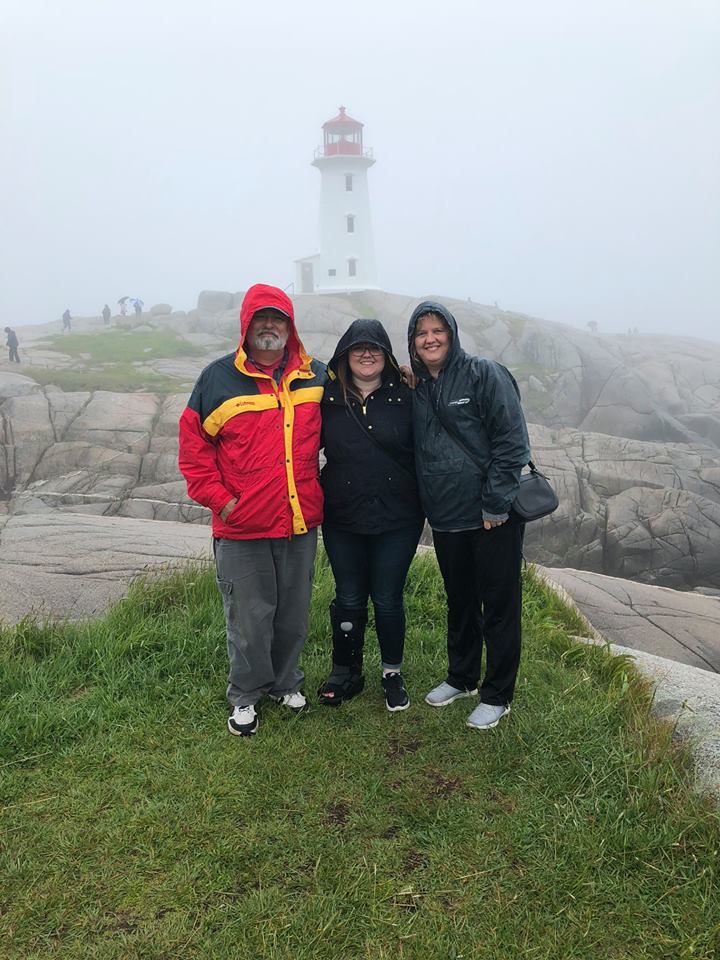
The Jones family on a picturesque foggy afternoon at Peggy’s Cove, Nova Scotia.
(Photo by Betty MacPherson Johnson.)
I have just returned from a week-long adventure to Nova Scotia, Canada.
Nova Scotia (which means “New Scotland” in Latin) is one of Canada’s three maritime provinces on it’s eastern side and lies pretty much directly east of the state of Maine, separated by less than 100 miles of the Atlantic Ocean. Even though it is 1451 air miles from Minneapolis, it lies at approximately the same latitude. (45 degrees north.)
Because it is surrounded by ocean, (with no point in Nova Scotia more than 42 miles from the ocean.) the climate is a bit milder than ours, both summer and winter. The average high temp in July is 75 F, with an average low of 55. January has an average low of 17 F and an average high of 32. Snowfall in Nova Scotia is extremely variable based on location within the province, varying between 60 and 120 inches per year. By comparison, Minneapolis averages 45 inches per year.
It’s a beautiful province, described on vehicle license plates as “Canada’s Ocean Playground” with no shortage of scenic views of lakes (5400 of them) deep valleys, mountain vistas overlooking the ocean, and picturesque sea-side fishing villages. The Cabot Trail on Cape Breton Island in northern Nova Scotia is particularly beautiful and includes the possibility of seeing whales and a moose on the same drive.
A classic characteristic of Nova Scotia, as with Canada in general, are the vast numbers of Tim Hortons coffee shops where one can get a large “double-double” (coffee with double cream and double sugar) and a box of assorted Tim Bits (donut holes) 24 hours a day pretty much anywhere. Also available (in Nova Scotia only) are oat cakes, which are essentially a square oatmeal cookie with a long Scottish history. Oat cakes are so popular it’s not unusual for a Tim Hortons to run out of them later in the morning.
Just to the North of Nova Scotia is Prince Edward Island, which is a separate province referred to by most Canadians as simply P.E.I. It’s also gorgeous and is famed for its potato crop, grown in strikingly red soil. Songs have been written about the quality of the spuds grown in the bright red mud.
Of course, high-quality potatoes are essential for a decent serving of fish and chips (we call them “french fries) but they are also the central ingredient in a dish called “poutine.” This is a large serving of french fries and cheese curds covered in brown gravy. Yes, you read that correctly. French fries, cheese, and gravy. Lots of gravy. Poutine is available at virtually every restaurant we saw from KFC to McDonald’s to pizza parlors. I believe we even saw an Asian restaurant that offered poutine.
Nova Scotia’s history is, of course, tied to Scotland. On one particular day, we ventured to Pictou in northern Nova Scotia where there was a historically accurate full-size reproduction of the ship Hector floating in the harbor and available for public tours. The Hector was the ship used in the first historically significant migration of Scottish settlers to Nova Scotia in 1773.
The Hector left Lochbroom, Scotland around the second week in July of 1773 with 189 Highland Scots aboard. Its departure was several months behind schedule and the settlers aboard faced horrific hardships. At one point, a storm with gale-force winds drove the ship back over a hundred miles and the passengers begged the captain to turn back and return them to Scotland.
He refused, even though the Hector was in poor condition when it had left Scotland and it would take two weeks to regain the distance the storm had blown them backwards. Dysentery and smallpox claimed the lives of 18 passengers before they dropped anchor in Pictou Harbor on September 15, fully 11 weeks after they had left Scotland.
They thanked God upon their arrival, but quickly fell into a state of despair when they learned that the promised ready-built shelters and cleared fields they had been promised by the ship’s owner, Mr. John Pagan, did not exist.
In touring the ship, one wonders how they survived at all. The ship was only 85 feet long and there were no windows in that dark, damp hold. We were told the area below decks was lit with fish oil lamps. The bunks were more like storage racks in a warehouse, certainly too small to stretch out in. The settlers were rationed one pint of fresh water per day each, to be used for both washing and drinking. Among their other rations were oat cakes, many of which had become moldy before the journey ended.
It was not hard to imagine how difficult and downright awful the conditions in the belly of that ship were. Its also not hard to imagine their despair when they learned that it was far too late to plant a crop and they would face winter without sufficient food or shelter. Some sold items of clothing to survive or entered into indentured servitude.
But survive they did.
And, among the items in the museum we toured was a wooden box labeled, “SHIP’S BIBLE.”
They had been lied to, horribly mistreated, faced death and disease and sickness, and even been denied the option to give up and go back from where they had come.
We know that Christianity was at the center of the founding of the United States, but we are not the only ones who relied on faith to sustain us. We are not the only ones who have been blessed beyond measure. We are not the only people that God has loved.
When I look at the life I lead today, I am ashamed and embarrassed that I almost complained out loud that the gravy on my poutine was a couple of degrees cooler than I would have liked or that the seat on the jet aircraft that brought me over 1400 miles in less than a day was too hard.
God has smiled on me in so many ways, I could spend the rest of my life in constant gratitude and praise of Him and come no where near what He is really due.
And most of all, as every song and every preacher and every announcer on Kinship Christian Radio tells us, the real gratitude is not due for the temporary blessings we experience in this life, but for the blessing of eternal life bought and paid for with the precious, holy blood of Jesus Christ.
Today’s Praise
For our light affliction, which is but for a moment, worketh for us a far more exceeding and eternal weight of glory; While we look not at the things which are seen, but at the things which are not seen: for the things which are seen are temporal; but the things which are not seen are eternal. 2 Corinthians 4:17 & 18 (KJV)
Written by Dan Jones

